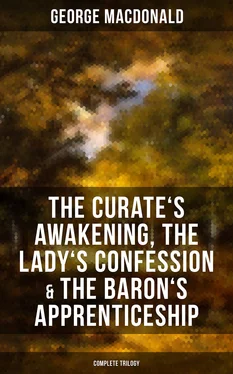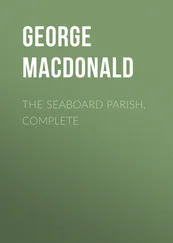"Come then, sore heart, and see whether his heart cannot heal thine. He knows what sighs and tears are, and if he knew no sin in himself, the more pitiful must it have been to him to behold the sighs and tears that guilt wrung from the tortured hearts of his brethren and sisters. Brothers, sisters, we MUST get rid of this misery of ours. It is slaying us. It is turning the fair earth into a hell, and our hearts into its fuel. There stands the man, who says he knows: take him at his word. Go to him who says in the might of his eternal tenderness and his human pity—COME UNTO ME, ALL YE THAT LABOUR AND ARE HEAVY-LADEN, AND I WILL GIVE YOU REST. TAKE MY YOKE UPON YOU, AND LEARN OF ME; FOR I AM MEEK AND LOWLY IN HEART: AND YE SHALL FIND REST UNTO YOUR SOULS. FOR MY YOKE IS EASY AND MY BURDEN IS LIGHT."
CHAPTER XIV.
A SERMON TO HIMSELF.
Table of Contents
Long ere he thus came to a close, Wingfold was blind to all and every individuality before him—felt only the general suffering of the human soul, and the new-born hope for it that lay in the story of the ideal man, the human God. He did not see that Helen's head was down on the book-board. She was sobbing convulsively. In some way the word had touched her, and had unsealed the fountain of tears, if not of faith. Neither did he see the curl on the lip of Bascombe, or the glance of annoyance which, every now and then, he cast upon the bent head beside him. "What on earth are you crying about? It is all in the way of his business, you know," said Bascombe's eyes, but Helen did not hear them. One or two more in the congregation were weeping, and here and there shone a face in which the light seemed to prevent the tears. Polwarth shone and Rachel wept. For the rest, the congregation listened only with varying degrees of attention and indifference. The larger portion looked as if neither Wingfold nor any other body ever meant anything—at least in the pulpit.
The moment Wingfold reached the vestry, he hurried off the garments of his profession, sped from the Abbey, and all but ran across the church-yard to his lodging. There he shut himself up in his chamber, fearful lest he should have said more than he had yet a right to say, and lest ebbing emotion should uncover the fact that he had been but "fired by the running of his own wheels," and not inspired by the guide of "the fiery-wheeled throne, the cherub Contemplation." There, from the congregation, from the church, from the sermon, from the past altogether, he turned aside his face and would forget them quite.
What had he to do with the thing that was done,—done with, and gone, either into the treasury or the lumber-room, of creation? Towards the hills of help he turned his face—to the summits over whose tops he looked for the dayspring from on high to break forth. If only Christ would come to him!—Do what he might, however, his thoughts WOULD wander back to the great gothic gulf into which he had been pouring out his soul, and the greater human gulfs that opened into the ancient pile, whose mouths were the faces that hid the floor beneath them—until at length he was altogether vexed with himself for being interested in what he had done, instead of absorbed in what he had yet to do. He left therefore his chamber, and placed himself at a side-table in his sitting-room, while his landlady prepared the other for his dinner. She too had been at church that morning, whence it came that she moved about and set the things on the table with unusual softness, causing him no interruption while he wrote down a line here and there of what afterwards grew into the following verses—born in the effort to forget the things that were behind, and reach forth after the things that lay before him.
Yes, Master, when thou comest thou shalt find
A little faith on earth, if I am here!
Thou know'st how oft I turn to thee my mind,
How sad I wait until thy face appear!
Hast thou not ploughed my thorny ground full sore,
And from it gathered many stones and sherds?
Plough, plough and harrow till it needs no more—
Then sow thy mustard-seed, and send thy birds.
I love thee, Lord; and if I yield to fears,
Nor trust with triumph that pale doubt defies,
Remember, Lord, 'tis nigh two thousand years,
And I have never seen thee with mine eyes.
And when I lift them from the wondrous tale,
See, all about me has so strange a show!
Is that thy river running down the vale?
Is that thy wind that through the pines doth blow?
Couldst thou right verily appear again,
The same who walked the paths of Palestine,
And here in England teach thy trusting men,
In church and field and house, with word and sign?
Here are but lilies, sparrows, and the rest!—
My hands on some dear proof would light and stay!
But my heart sees John leaning on thy breast,
And sends them forth to do what thou dost say.
Table of Contents
"Extraordinary young man!" exclaimed Mrs. Ramshorn as they left the church, with a sigh that expressed despair. "Is he an infidel or a fanatic? a Jesuit or a Socinian?"
"If he would pay a little more attention to his composition," said Bascombe indifferently, "he might in time make of himself a good speaker. I am not at all sure there are not the elements of an orator in him, if he would only reflect a little on the fine relations between speech and passion, and learn of the best models how to play upon the feelings of a congregation. I declare I don't know, but he might make a great man of himself. As long as he don't finish his sentences however, jumbles his figures, and begins and ends abruptly without either exordium or peroration, he needn't look to make anything of a preacher—and that seems his object."
"If that be his object, he had better join the Methodists at once. He would be a treasure to them," said Mrs. Ramshorn.
"That is not his object, George. How can you say so?" remarked Helen quietly, but with some latent indignation.
George smiled a rather unpleasant smile and held his peace.
Little more was said on the way home. Helen went to take off her bonnet, but did not re-appear until she was called to their early Sunday dinner.
Now George had counted upon a turn in the garden with her before dinner, and was annoyed—more, it is true, because of the emotion which he rightly judged the cause of her not joining him, than the necessity laid on him of eating his dinner without having first unburdened his mind; but the latter fact also had its share in vexing him.
When she came into the drawing-room it was plain she had been weeping; but, although they were alone, and would probably have to wait yet a few minutes before their aunt joined them, he resolved in his good nature to be considerate, and say nothing till after dinner, lest he should spoil her appetite. When they rose from the table, she would have again escaped, but when George left his wine and followed her, she consented, at his urgent, almost expostulatory request, to walk once round the garden with him.
As soon as they were out of sight of the windows, he began—in the tone of one whose love it is that prompts rebuke.
"How COULD you, my dear Helen, have so little care of your health, already so much shaken with nursing your brother, as to yield your mind to the maundering of that silly ecclesiastic, and allow his false eloquence to untune your nerves! Remember your health is the first thing—positively the FIRST and foremost thing to be considered, both for your own sake and that of your friends. Without health, what is anything worth?"
Helen made no answer, but she thought with herself there were two or three things for the sake of which she would willingly part with a considerable portion of her health. Her cousin imagined her conscience-stricken, and resumed with yet greater confidence.
Читать дальше












